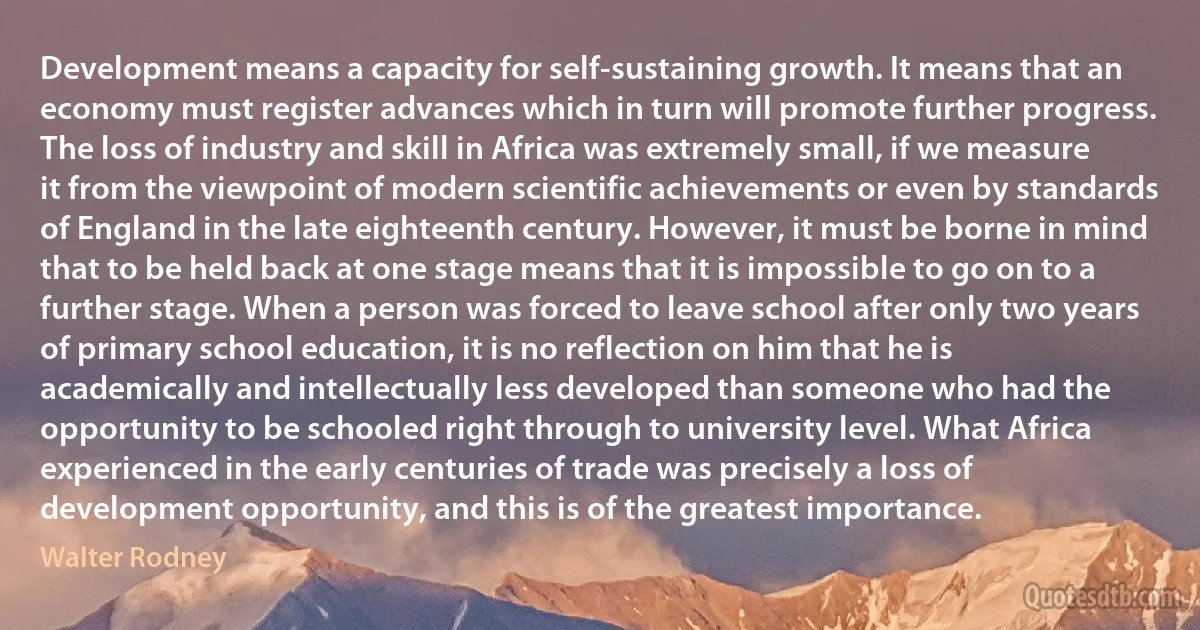
Development means a capacity for self-sustaining growth. It means that an economy must register advances which in turn will promote further progress. The loss of industry and skill in Africa was extremely small, if we measure it from the viewpoint of modern scientific achievements or even by standards of England in the late eighteenth century. However, it must be borne in mind that to be held back at one stage means that it is impossible to go on to a further stage. When a person was forced to leave school after only two years of primary school education, it is no reflection on him that he is academically and intellectually less developed than someone who had the opportunity to be schooled right through to university level. What Africa experienced in the early centuries of trade was precisely a loss of development opportunity, and this is of the greatest importance.
Walter RodneyRelated topics
bear century development early education eighteenth hold impossible industry late leave less loss measure mind opportunity person primary reflection right school skill small trade turn means someone years viewpointRelated quotes
Just as the various trades are most highly developed in large cities, in the same way food at the palace is prepared in a far superior manner. In small towns the same man makes couches, doors, plows and tables, and often he even builds houses, and still he is thankful if only he can find enough work to support himself. And it is impossible for a man of many trades to do all of them well. In large cities, however, because many make demands on each trade, one alone is enough to support a man, and often less than one: for instance one man makes shoes for men, another for women, there are places even where one man earns a living just by mending shoes, another by cutting them out, another just by sewing the uppers together, while there is another who performs none of these operations but assembles the parts, Of necessity, he who pursues a very specialised task will do it best.

Xenophon
A final aspect of all open access orders is Schumpeter's notion of creative destruction, one of the most powerful descriptions of a competitive, open access economy. When Schumpeter wrote Capitalism, Socialism, and Democracy in the early 1940s, the economic theory of perfect competition among atomistic firms (i. e., firms too small to have market power) had come under sustained attack as unrealistic. Large and powerful economic organizations dominated the new economy, and their behavior did not match the textbooks. Despite this dominance, the economy produced historically unprecedented, sustained economic development. Schumpeter asked, How could large businesses that were supposed to choke off competition and growth nonetheless generate such spectacular productivity increases in a world that seemed ever more competitive?

Douglass North
The unremitting division of labour resulted in admirable levels of productivity. The company's success appeared to bear out the principles of efficiency laid down at the turn of the twentieth century by the Italian economist Vilfredo Pareto, who theorized that a society would grow wealthy to the extent that its members forfeited general knowledge in favour of fostering individual ability in narrowly constricted fields. In an ideal Paretan economy, jobs would be ever more finely subdivided to allow for the accumulation of complex skills, which would then be traded among workers. ... But however great the economic advantages of segmenting the elements of an afternoon's work into a range of forty-year-long careers, there was reason to wonder about the unintended side effects of doing so. In particular, one felt tempted to ask ... how meaningful the lives might feel as a result.

Alain de Botton
I am presently at work on a dissertation dealing with the theory of international trade and foreign exchange rates. In dealing with this, studies of the intervention of recent years in the area of trade and exchange rates of different countries is of the greatest importance. I therefore hope to be able to begin a six month study tour to Switzerland, France and England at the end of May this year. After having collected the necessary material I intend - if the economic side can be arranged - during a stay of 6–12 months in England (probably Cambridge) or possibly the United States (in that case probably Harvard University) - to work out the above mentioned dissertation as a specimen for the doctoral degree in philosophy and pursue studies in general. I have not yet any detailed study plan. That should appropriately be set up after the arrival.

Bertil Ohlin
Decidedly, we are at cross-purposes. What's all this you tell [from England] about the modern movement, commercialism, etc, etc? It bears no relation to our concept of art, at any rate here... That is where the error lies. Trade serves those up to us as readily as anything else; so it is no use. Wouldn't it be better to steep ourselves in genuine nature again? I do not consider in the least that we are making a mistake, that we should turn to the steam-engine and follow the general public [ William Morris, the more traditional artist became very popular those days]... No, a thousand times no! We are here to point the way.... the remedy is to be found in nature, more than ever. Let us follow what we consider to be the proper aim, we shall see who is right. After all, money is a fragile thing; let us earn some of it, since we must, but let us keep to our role.

Camille Pissarro
